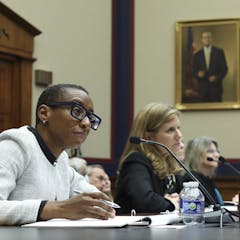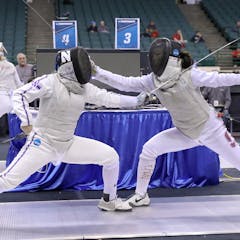
Articles on Ivy League
Displaying 1 - 20 of 24 articles

A few Ivy League schools say the tests enable them to find students of promise from low-income families. But not all sociologists agree.

Barring evidence of moral turpitude or excessive absenteeism, former administrators are very hard to force out.

Threats from disappointed donors over the language used during campus protests about the Israel-Hamas conflict have become angrier and more public than in the past.

University codes of conduct support their mission to educate. But it’s not easy to balance those codes with the values of free speech, as the resignation of a prominent university president shows.

Despite what’s happening on the most prestigious campuses, fewer than a third of presidents at American colleges and universities are women.

Elite universities have been giving special preference to children of prior graduates for more than a century. Has the time come for that practice to stop? A sociologist weighs in.

When the directors of a company are graduates of the same school as the executive, their ability to hold the executive accountable for his or her decisions becomes compromised.

Shutting down sports teams can save schools millions of dollars but create longer-term challenges for enrollment, fundraising and campus life.

For the past two decades graduates of America’s most selective universities have dominated the Time 100 list. Will that always be the case?

With more colleges and universities than ever making the SAT or ACT optional for admission, two scholars weigh in on what that means for students and their families.

An expert explains the many reasons why people behave in an unethical manner and what research shows on why the wealthy have a need to maintain their higher status.

The college admission cheating scandal recently announced by the Department of Justice shows why colleges should admit students via lottery, argues an expert on college admissions.

The college admission scandal that involved big bribes, coaches and Hollywood actors grew out of a system that favors rich parents and gives coaches too much leeway in admissions, a scholar argues.

Colleges and universities are often criticized for how they admit students from diverse groups. A college admissions scholar suggests an admissions lottery could help make the process more fair.

T.M. Landry College Prep, facing allegations of abuse, is known for getting students from poor backgrounds into Ivy League schools. An education scholar says the school’s focus was misplaced.

How can elite institutions and an elite territory originate key collaborative practices such as hacking, open knowledge and open innovation? We found out during a recent visit.

The 1968 protests at Columbia University led the institution to abandon a gym project that residents considered racist and cut off its defense work – and generated worldwide attention in the process.

Students and government officials alike hope Harvard’s admission files will yield clues about who gets in and why, but a Harvard researcher says their efforts will be in vain.

Colleges and universities boast US$547 billion in endowment assets, yet only a handful of elite schools would be taxed under the proposal.

Millions of people have imagined California, but only one man was its historian.
